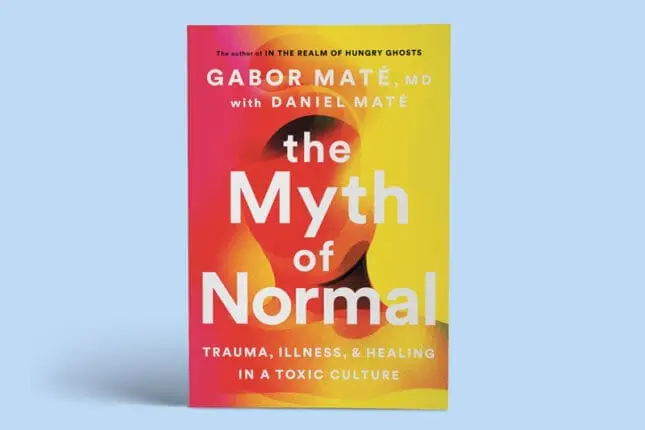The Myth of Normal: Trauma, Illness, and Healing in a Toxic Culture.
By Gabor Maté, with Daniel Maté
New York: Avery, 2022
Gabor Maté’s new book, The Myth of Normal, is both alarming and inspiring. As Maté reminds us, citing research to underscore his points, we live in a culture where obsessing about wellness, fitness, and our bodies is considered normal. It also represents a multimillion-dollar industry. We’re encouraged to take supplements, get massages and acupuncture, rest in flotation tanks, do yoga, and tone our bodies in gyms and on stationary bikes. Yet while consumers spend millions of dollars on these activities, the mental, physical, and emotional health of human beings, particularly in capitalist societies, has been steadily declining.
Our vulnerability to stress-related medical conditions like cancer, heart disease, type II diabetes, and kidney disease has increased dramatically. Maté argues this is partly because we’ve replaced natural endorphin-releasing social habits like playing, exercising, dancing, and creating music with more solitary, dopamine-seeking behaviors like mindless eating and playing video games. Despite the healthy-food movement, obesity has become the biggest global health problem, borne of our addiction to sugary, high-carbohydrate foods that temporarily regulate our stress responses and numb our bodies. “The worldwide obesity epidemic is a marker of the international stress epidemic,” he writes. Our highly stressful world is made more stressful by our out-of-whack work–life balance, our drive to accumulate consumer goods, and our habit of interacting with screens all day.
Moreover, Maté argues that we remain stubbornly oblivious to the impact of injustice on health. “Both inequality and poverty stir the by-now familiar brew of disturbed genetic function, inflammation, chromosomal and cellular aging, physiological wear and tear, hormonal disturbances, cardiovascular effects, and immune debility, all of which combine to bring illness, disability, and death.” Referencing statistics highlighting the vulnerability of people of color to stress-related disease and pointing to the healthcare system’s failure to respond to the impacts of structural racism, Maté raises the question, “How bad must it get for societies to pay attention to the relationship between inequality and disease?”
He makes the same point regarding gender. Women, he says, are at a much higher risk of developing chronic pain, migraines, fibromyalgia, and autoimmune conditions such as rheumatoid arthritis, multiple sclerosis, and chronic fatigue syndrome. They’re also more likely to develop cancers unrelated to smoking, and they’re at higher risk for anxiety, depression, and posttraumatic stress disorder. Maté has a hypothesis for these health-related gender differences: “Women often serve as the emotional glue—the connective tissue, if you like—that keeps nuclear and extended families and communities together. In our ailing culture, it is no coincidence they suffer far more than men do from diseases of actual connective tissue, among which lupus, rheumatoid arthritis, scleroderma, fibromyalgia, and their multiple relatives are variants. [T]hese conditions, as most chronic maladies do, reflect social dynamics, not simply individual physiology gone rogue.”
Maté argues for a fundamental reorganization of priorities in our societies, beginning with how we treat pregnant women, how we raise our children, what we eat, and what we prioritize in our lives. “What is missing?” he asks. “Human connection and meaningfulness. Rates of loneliness are high and are associated with diseases like heart disease and cancer comparable to the risk of smoking 15 cigarettes a day. Social isolation inhibits the immune system, promotes inflammation, agitates the stress apparatus, and increases the risk of death from heart disease and strokes.”
Although he makes the compelling case that we should address these issues long before they require the services of a mental health professional, the reality is that doctors and other medical authorities tend to overlook the mind–body connection in their assessment of our ailments, treating physical illness as separate from our overall emotional wellbeing. As therapists, when our clients come to us suffering from a range of physical, emotional, spiritual, and mental health problems, we can help by validating their suffering as part of a society-wide loss of connection, rather than as individual pathology. We can help them take their struggles less personally by universalizing their experience. We can let them know their feelings aren’t just the result of a traumatic childhood or a personality flaw. After all, Maté reminds us, mental illness is a medical term, not a label for a suffering human being.
Much of what we consider normal, Maté argues, is distorted by cultural norms that—upon closer examination—are not normal at all. Our clients often believe that if they adapt well enough to fit in and succeed in our addicted, high-stress, unjust society, they’ll finally feel safe and fulfilled. Many of our clients, he says, yearn in vain for what they could only feel in a different kind of society, one that understood them as unique individuals within a larger, interconnected network and had evolved to support their innate needs for both attachment and authenticity.
So where does that leave us? He suggests we practice assuming a countercultural therapeutic orientation. We heal, he says, as we move toward wholeness using our capacity for healthy anger, agency, authenticity, and acceptance. Healthy anger is not “angry at” but rather “angry on behalf of.” It gives us the courage to cultivate agency and authenticity, rather than simply decrying the state of things. Agency is something we can practice by attending protests and fighting for justice. Agency is also something we can practice in therapy by giving the client choices and control. For years, I’ve been saying to my clients, “If you want to talk about it, we can. If you don’t want to talk about it, we won’t. You may not have had a choice over what happened to you, but you do have a choice about whether to talk about it.” Looking through the lens of The Myth of Normal, I can see that I’ve been trying to reinforce in my clients the sense of agency Maté believes is critical to empowering ourselves in a toxic culture. “[W]hat is considered normal and natural,” he says, “was established not by what is good for people, but by what is expected of them, which traits and attitudes serve the maintenance of the culture.”
For some clients, it may feel liberating to realize that their personalities, or elements of it, are an adaptation. In a society where we’re isolated from each other, we tend to shame and blame ourselves for our struggles, pain, and disappointments. Viewing our physical and mental suffering as an artifact of—or reaction to—our culture offers a fresh perspective that can bring a degree of relief. But Maté’s intent isn’t just to liberate us; it’s to challenge us and our cultural assumptions. Whether or not the reader agrees with all his conclusions, The Myth of Normal offers a fascinating, thought-provoking reframing of trauma and illness, enlarging our perspective in ways that can make us better and more compassionate therapists.
Janina Fisher
Janina Fisher, PhD, is a licensed clinical psychologist and former instructor at The Trauma Center, a research and treatment center founded by Bessel van der Kolk. Known as an expert on the treatment of trauma, Dr. Fisher has also been treating individuals, couples and families since 1980.
She is past president of the New England Society for the Treatment of Trauma and Dissociation, an EMDR International Association Credit Provider, Assistant Educational Director of the Sensorimotor Psychotherapy Institute, and a former Instructor, Harvard Medical School. Dr. Fisher lectures and teaches nationally and internationally on topics related to the integration of the neurobiological research and newer trauma treatment paradigms into traditional therapeutic modalities.
She is author of the bestselling Transforming the Living Legacy of Trauma: A Workbook for Survivors and Therapists (2021), Healing the Fragmented Selves of Trauma Survivors: Overcoming Internal Self-Alienation (2017), and co-author with Pat Ogden of Sensorimotor Psychotherapy: Interventions for Attachment and Trauma.(2015).













